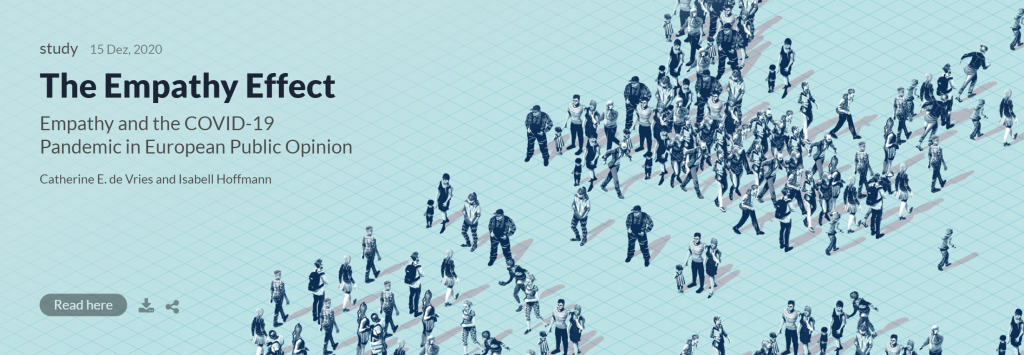15 diciembre 2020 Internacional
With European unity and empathy against COVID-19

Good news from Europe in the midst of the pandemic: Europeans are very willing to adhere to the rules for combatting COVID-19 and to act as one to overcome the crisis. That is the finding from an eupinions study that surveyed 13,000 EU citizens. eupinions is the Bertelsmann Stiftung’s tool for researching public opinion across Europe. It is operated in partnership with the King Baudouin Foundation
Gütersloh – December 15, 2020. According to the survey, 89 percent of all Europeans believe that the EU should play a greater role in combatting the pandemic, and 91 percent feel the member states should work more closely together during the crisis. Moreover, 90 percent say they are complying with the COVID-19 rules put in place by their respective government, with 70 percent saying they wear a mask when many other people are present.
Across Europe, there is little tendency to blame only one country for the pandemic’s outbreak. In contrast to the euro crisis – when practical crisis-management efforts were long compromised by destructive attempts to assign blame – Europeans are not inclined this time to point a finger at others. Overall, 72 percent are unwilling to blame any one country.
The European idea is getting an additional boost from another factor documented by the eupinions survey, which was conducted in June 2020: Europeans with a high level of empathy are more willing to participate in collective endeavors. That is true for both individual efforts and efforts undertaken by Europe as a whole. Of those Europeans evincing a high level of empathy, 93 percent say they stick to the rules for combatting COVID-19, compared to 86 percent for the less empathetic. Similarly, 76 percent of highly empathetic respondents say they consistently wear a mask, while 64 percent of the less empathetic say the same.

Politicians have a special responsibility
That means Europe’s heads of state and government can continue to count on the vast majority of Europeans to endorse their wide-ranging policies for combatting the crisis. “Empathy is a valuable resource when it comes to gaining the support of Europe’s citizens for joint European policies,” says Isabell Hoffmann, co-author of the study and founder of eupinions.
Across the EU, there are slightly more people with a high empathy level (55 percent) than with a low level (45 percent). Women (65 percent), people who are older (61 percent of 56 to 70-year-olds) and people who identify as politically left of center (61 percent) are more empathetic than those who are younger, more affluent or who see themselves as politically right of center.
As research has shown, the ability to empathize is a trait that varies from person to person, yet it can also be reinforced or weakened by external triggers. “Politicians would therefore do well to make effective use of this factor,” Hoffmann says. “They bear a special responsibility, since they can choose how they set the tone of the public debate through their style and rhetoric, thereby significantly influencing the public’s attitudes. Many people are all too ready to believe that the world is full of egoists, but the pandemic has shown us that people are quite willing to get involved on behalf of the common good.”
Additional information
eupinions is the Bertelsmann Stiftung’s tool for researching public opinion in Europe, and was developed in cooperation with Prof. Catherine de Vries of Bocconi University in Milan and Dalia Research in Berlin. It is operated in partnership with the Begian King Baudouin Foundation. It is used to survey EU citizens on European issues four times a year. The current survey took place in June 2020 and, with12,956 respondents, is representative of the EU and seven member states: Germany, France, Italy, Poland, Spain, the Netherlands and Belgium. Detailed information on the methodology used can be found in the appendix to the study.
The study and other EU-wide survey data are available at www.eupinions.eu
